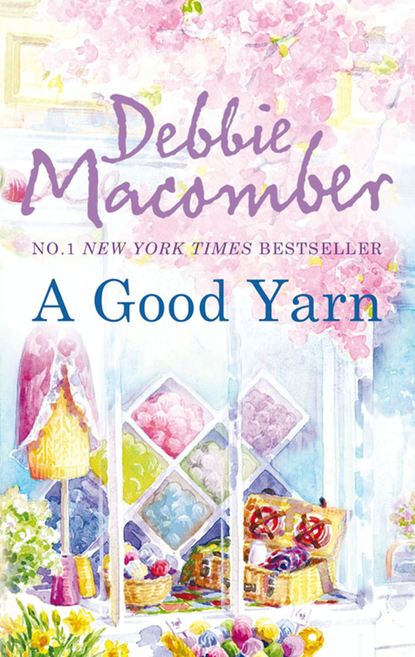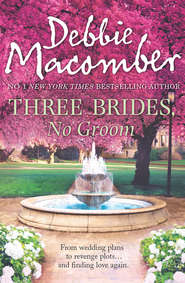По всем вопросам обращайтесь на: info@litportal.ru
(©) 2003-2024.
✖
A Good Yarn
Автор
Год написания книги
2019
Настройки чтения
Размер шрифта
Высота строк
Поля
Finally I couldn’t stand it any longer and my resolve to give her a chance to get over her bad mood disappeared. “What’s wrong with you?” I demanded. I have to admit I felt impatient; lately, she’s brought her surly moods to work a little too often.
Facing me, Margaret managed a tentative smile. “Nothing … sorry. It’s just that this feels a whole lot like a Monday.”
Because the shop is closed on Mondays, Tuesday is our first workday of the week. I frowned at her, trying to figure out what the real problem was. But she’d assumed a perfectly blank expression, telling me nothing.
My sister is a striking woman with wide shoulders and thick, dark hair. She’s tall and lean, but solid. She still looks like the athlete she used to be. I wish she’d do something different with her hair, though. She wears the same style she did in high school, parted in the middle and stick-straight until it hits her shoulders, where it obediently turns under, as if she’s tortured it with a curling iron. That was certainly part of her teenage regimen—the curling iron, the hair spray, the vigorously wielded brush. The style’s classic and it suits her, I suppose, but I’d give anything to see her try something new.
“I’m going to post a new class,” I said, changing the subject abruptly, hoping to draw her out of her dour mood.
“In what?”
Ah, interest. That was a good sign. For the most part, all the classes I’d held had gone well. I’d taught a beginners’ class, an intermediate and a Fair Isle, but there was one I’d been thinking of offering for a while.
“It’s such a difficult question?”
My sister’s sarcasm shook me from my brief reverie. “Socks,” I told her. “I’m going to offer a class on knitting socks.”
With the inventive new sock yarns on the market, socks were the current knitting rage. I carried a number of the European brands and loved the variety. My customers did, too. Some of the new yarns were designed to create an intricate pattern when knitted. I found it amazing to view a finished pair of socks, knowing the design had been formed by the yarn itself and not the knitter.
“Fine.” Margaret’s shoulders rose in a shrug. “I suppose you’re going to suggest knitting them on circular needles versus the double-pointed method,” she said casually.
“Of course.” I preferred using two circular needles.
Margaret would rather crochet and while she can knit, she doesn’t often. “There seems to be a lot of interest in socks lately, doesn’t there?” Her tone was still casual, almost indifferent.
I regarded my sister closely. She always had a list of three or four reasons any idea of mine wouldn’t work. It had become practically a game with us. I’d make some suggestion and she’d instantly tell me why it was bound to fail. I missed having the opportunity to state my case.
“So you think a sock class would appeal to our customers?” I couldn’t help asking. Good grief, there had to be something drastically wrong with Margaret.
Personally, I was fond of knitting socks for reasons beyond the current popularity. The biggest attraction for me was the fact that a pair of socks was a small project. After finishing an afghan or a Fair Isle sweater, I usually wanted a project I knew I could complete quickly. After knitting for endless hours, I found it gratifying to watch a sock take shape almost immediately. Socks didn’t require a major commitment of either time or yarn and made wonderful gifts. Yes, socks were definitely my choice for this new class. Because Tuesday seemed to be my slowest business day, it made sense to hold the sessions then.
Margaret nodded in answer to my question. “I think a sock class would definitely attract knitters,” she murmured.
I stared at my sister and, for an instant, thought I saw the sheen of tears in her eyes. I stared harder. As I mentioned earlier, Margaret rarely cries. “Are you feeling okay?” I asked, just in case, keeping my voice gentle. I didn’t want to pry, but if something really was wrong, she needed to know I was concerned about her.
“Stop asking me that,” she snapped.
I sighed with relief. The old Margaret was back.
“Would you make a sign for the window?” I asked. Margaret had much more artistic ability than I did. I’d come to rely on her for the window notices and displays.
With no real show of enthusiasm, she shrugged again. “I’ll have one up before noon.”
“Great.” I walked over to the front door, unlocked it and flipped the Closed sign to Open. Whiskers glanced up from his perch in the front window, where he lazed in the morning sun. Red Martha Washington geraniums bloomed in the window box. The soil looked parched, so I filled the watering can and carried it outside. From the corner of my eye I saw a flash of brown as a truck turned the corner. A familiar happiness stole over me. Brad.
Sure enough, he angled the big truck into the parking spot in front of Fanny’s Floral, the shop next to mine. He hopped out, all the while smiling at me.
“It’s a beautiful morning,” I said, reveling in his smile. This man smiles with his whole heart, his whole being, and he has the most intense blue eyes. They’re like a beacon to me. I swear I can see those eyes a mile away, they’re that blue. “Have you got a yarn delivery?” I asked.
“I’m the only delivery I have for you today, but I’ve got a couple of minutes if there’s coffee on.”
“There is.” It was our ritual. Brad stopped at the shop twice a week, with or without a load of yarn—more often if he could manage it. He never stayed long. He filled his travel coffee mug, took the opportunity to steal a kiss and then returned to his deliveries. As always, I followed him into the back room, pretending to be surprised when he eased me into his embrace. I love Brad’s kisses. This time he started with my forehead, then gradually worked his way down my face until he reached my lips. As his mouth moved over mine, I could feel the electricity through every inch of my body. He has that kind of effect on me—and he’s well aware of it.
He held me just long enough to let me regain my equilibrium. Then he released me and picked up the coffeepot. He was frowning when he turned around.
“Is there a problem between Margaret and Matt?” he asked.
I opened my mouth to assure him everything was fine, but before I could utter a word I stopped myself. All at once I realized I didn’t know. “What makes you ask?”
“Your sister,” he said in hushed tones. “She isn’t herself lately. Haven’t you noticed?”
I nodded. “Something’s definitely up with her,” I agreed, remembering how she’d declined the opportunity to wage verbal battle with me.
“Do you want me to ask her?” Brad inquired, forgetting to whisper.
I paused, afraid Margaret would take offense and snap at Brad the same way she had at me. “Probably not.” But then I changed my mind. My sister was half in love with Brad herself. If anyone could make it past that protective barrier of hers, he’d be the one. “Maybe, but not now.”
“When?”
“Perhaps we should all get together soon.”
Brad shook his head. “It’d be better if Matt wasn’t around.”
“Right.” I nibbled on my lower lip. “Do you have any other ideas?”
Before he could answer, Margaret tore aside the curtain to the back room and glared at us. Brad and I started, no doubt looking as guilty as we felt.
“Listen, you two lovebirds, if you’re going to talk about me I suggest you lower your voices.” With that, she dropped the curtain and stomped into the store.
2
CHAPTER
ELISE BEAUMONT
Retirement was everything Elise Beaumont had hoped it would be, and everything she’d feared. On the positive side, the alarm portion of her clock-radio had been permanently shut off. She woke when her body told her she no longer needed sleep, ate when she felt hungry and not when the school library set her break.
Then there were the negatives. For years she’d scrimped and saved, wanting to build her own home on her own small piece of land. After months of searching, months of visiting housing developments, she found the area and the development she’d always dreamed of. It was on the outskirts of the city, and if it didn’t have an ocean view, it was still beautiful, overlooking a grove of conifers. She could imagine having coffee on her small patio, watching deer emerge from the trees in the early morning. She raided her investment account and put down a large chunk of cash. She’d assumed the developer was a reputable one; to put it bluntly, he wasn’t. She, along with a handful of others, had been cheated and misled. Then the company declared bankruptcy within a month, and as a result she had no home, no savings and mounting legal bills. It was a nightmarish situation that continued to get worse.
As she lay in bed, she recalled that for years she’d wanted to travel beyond the Puget Sound area, where she’d been born and raised. Well, she couldn’t afford that now. But for the first time in her adult life she felt the urge to follow her creative bent. She planned to knit again and take an oil painting class. Having spent most of her career around books, she’d toyed with the idea of writing a novel. Maybe a children’s story … She was open to trying just about anything—once the class-action suit against the builder was settled. Until then, she could only obsess about her lack of funds and the legal battle before her.
Her life was on hold until she was free of this mess. It was all a waiting game now as the attorneys filed the paperwork and the lawsuit worked its way through the court system. At best, it would be a year before she and the others saw even a fraction of their money. If they did, and that was a big if. All she could do was hope and pray that all wasn’t lost.
The problems with the builder were only the start of her difficulties. Certain her house would be completed on time, she’d let go of the lease on her apartment. That had been an early mistake. The vacancy rate in Seattle was low and not only would it be difficult to find a new place, she was terrified of using the better part of her pension on an overpriced apartment. At her daughter’s suggestion, Elise had moved in with her. Just for a little while, she’d promised herself. Except that it had already been six months….
No—Elise refused to spend another second thinking about this financial disaster. It only depressed her. In her eagerness to have her own home, she’d lost practically everything. At least she had her health, her daughter and grandchildren, her sanity.
“Grandma, Grandma,” six-year-old John cried as he pounded urgently at her bedroom door. “Are you awake? I want to come in, okay?”











